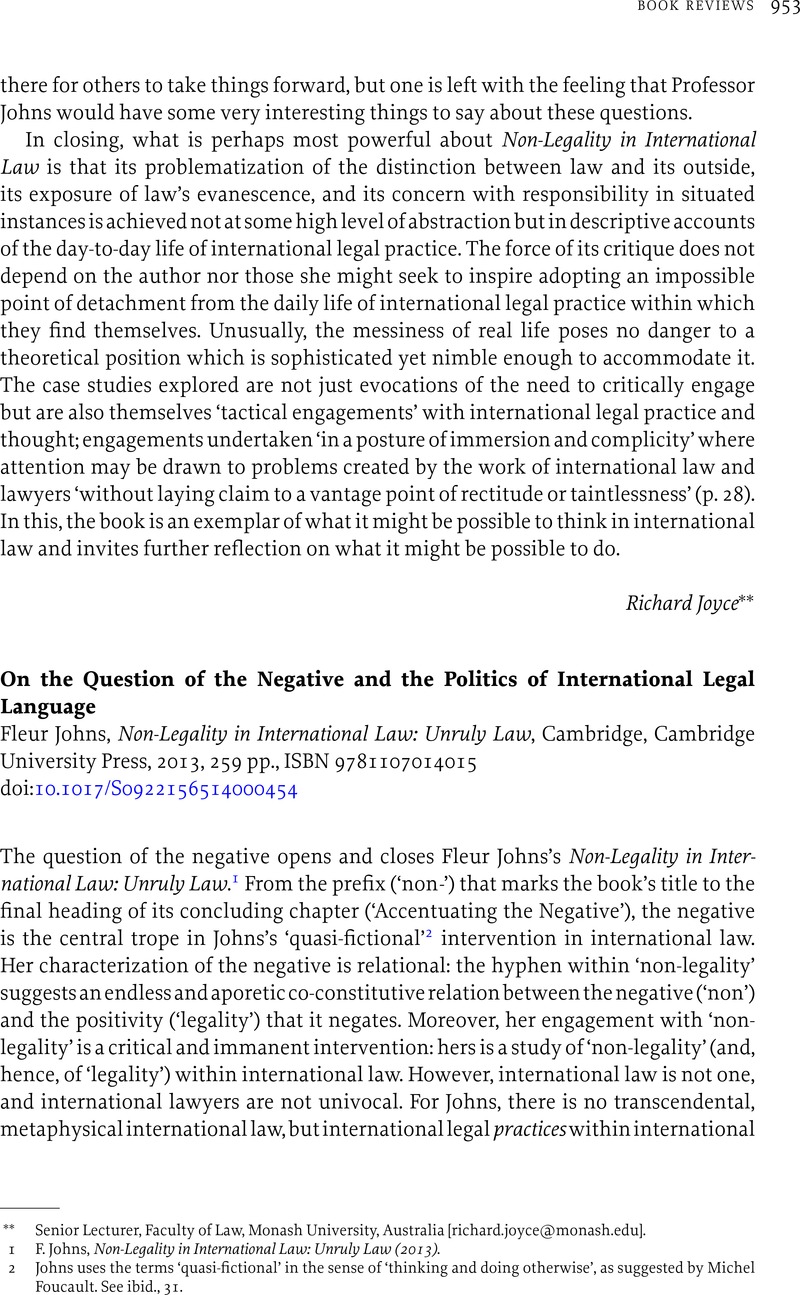Article contents
On the Question of the Negative and the Politics of International Legal Language - Fleur Johns, Non-Legality in International Law: Unruly Law, Cambridge, Cambridge University Press, 2013, 259 pp., ISBN 9781107014015
Published online by Cambridge University Press: 06 November 2014
Abstract

- Type
- BOOK REVIEWS: Reading Unruly Law
- Information
- Copyright
- Copyright © Foundation of the Leiden Journal of International Law 2014
References
1 F. Johns, Non-Legality in International Law: Unruly Law (2013).
2 Johns uses the terms ‘quasi-fictional’ in the sense of ‘thinking and doing otherwise’, as suggested by Michel Foucault. See ibid., 31.
3 For a definition of ‘field’ (inspired by the work of Pierre Bourdieu), see Leander, A., ‘Technological Agency in the Co-Constitution of Legal Expertise and the US Drone Program’, (2013) 26 LJIL 811CrossRefGoogle Scholar, at 816–17.
4 As Leander explains, ‘[f]ield analysis has often been used to analyse co-constitutive processes’; ‘[i]t usefully highlights first the contested character of legal expertise and second the mechanisms by which this expertise is likely to evolve’. Ibid., 816.
5 Here, ‘eventful’ refers to the aporetic notion of ‘event’ in the ‘post-foundational political thought’ referred to and commented by Johns, Fleur, Joyce, Richard, and Pahuja, Sundhya: Johns, F., Joyce, R. and Pahuja, S., ‘Introduction’, in Johns, F., Joyce, R., and Pahuja, S. (eds.), Events: The Force of International Law (2011), 1–17Google Scholar. See also Johns, supra note 1, 29; and, for both ‘post-foundational political thought’ and the ‘event’, see O. Marchart, Post-Foundational Political Thought: Political Difference in Nancy, Lefort, Badiou and Laclau (2007), respectively at 2 and 20.
6 I thus attempt a rereading of Johns's book by drawing inspiration from some critical theoretical works of both international law and international relations. In this regard, I would refer particularly to P. Fitzpatrick, ‘Latin Roots: The Force of International Law as Event’ in F. Johns, R. Joyce, and S. Pahuja (eds.), supra note 5, 43–54; and to R. B. J. Walker, After the Globe, Before the World (2010).
7 Her vocabulary comprises: ‘illegality, extra-legality, pre- and post-legality, supra-legality and infra-legality’: Johns, supra note 1, 1.
8 In this regard, Johns tells us that the insight (that ‘[w]herever international law is invoked, we see created that which international law purports to stand against, beside, before or after’) that grounds the argument of her book ‘is not novel’, and then, in a footnote, she refers to and quotes Martti Koskenniemi: ‘The law constructs its own field of application as it goes along, through a normative language that highlights some aspects of the world while leaving other aspects in the dark’. M. Koskenniemi, From Apology to Utopia: The Structure of International Legal Argument (2005), at 570 apud Johns, supra note 1, at 8–9, fn. 22 (my emphasis). My reference to ‘normative language’, then, comes from this passage of Koskenniemi quoted by Johns.
9 See J. Derrida, ‘Before the Law’ in J. Derrida, Acts of Literature (1992), 181–220; and J. Derrida, ‘Force of Law: The “Mystical Foundation of Authority”’, in J. Derrida, Acts of Religion (2002), 230–98.
10 See J. Derrida, ‘Faith and Knowledge: The Two Sources of “Religion” at the Limits of Reason Alone’ in Derrida, Acts of Religion, supra note 9, 40–101; and J. Derrida, Monolingualism of the Other; or, The Prosthesis of Origin (1998).
11 Derrida, Monolingualism, supra note 10, 39–40.
12 Ibid.
13 Ibid.
14 J. Derrida, ‘Faith and Knowledge’, supra note 10, 66.
15 See P. Fitzpatrick, Modernism and the Grounds of Law (2001); P. Fitzpatrick, ‘Foucault's Other Law’, in B. Golder (ed.), Re-reading Foucault: On Law, Power and Rights (2013), 39–63; and Walker, supra note 6.
16 See Leander, supra note 3; Bigo, D. and Walker, R. B. J., ‘Political Sociology and the Problem of the International’, (2007) 35 Millennium – Journal of International Studies, 725–40CrossRefGoogle Scholar; and Bigo, D. and Walker, R. B. J., ‘International, Political, Sociology’, (2007) 1 International Political Sociology, 1–5CrossRefGoogle Scholar. And for the relation between the anthropological and the sociological, considering ‘[t]he concept of society in anthropology’, see E. Viveiros de Castro, ‘O Conceito de Sociedade em Antropologia’, in E. Viveiros de Castro, A Inconstância da Alma Selvagem (2011), 297–316.
17 In general, see J. Derrida, Of Grammatology (1997).
18 Ibid., 314.
19 Ibid., 144.
20 Ibid., 145.
21 Ibid., 145. (emphasis in the original)
22 Ibid., 157.
23 Ibid., 314.
24 Derrida, supra note 17, 241.
25 Derrida, ‘Faith and Knowledge’, supra note 10, 66.
26 Ibid.
27 Ibid., 66–67 and 79.
28 Ibid., 66.
29 Ibid., 66–67 (my emphasis).
30 I am referring here to my earlier reference to Johns on Koskenniemi, concerning the normative character of language. See supra note 8.
31 Derrida, Monolingualism, supra note 10, 39–40.
32 Ibid.
33 For a problematization of the equation between the ‘international’ and the ‘world’, see Walker, supra note 6.
34 J. Derrida, ‘Des Tours de Babel’ in Derrida, Acts of Religion (2002), 102–134, at 111.
35 Ibid.
36 Ibid.
38 Koskenniemi, M., ‘Constitutionalism as Mindset: Reflections on Kantian Themes about International Law and Globalization’, (2007) 8 Theoretical Inquiries in Law 9Google Scholar, at 19. Compare with Derrida's famous passage: ‘There is nothing outside of the text [there is no outside-text; il n’y a pas de hors-texte]’: Derrida, supra note 17, 158 (emphases in the original).
39 Viveiros de Castro, supra note 16, 297 (emphasis in the original).
41 See Walker, supra note 6. See also S. Gaston, The Concept of World from Kant to Derrida (2013).
- 1
- Cited by




